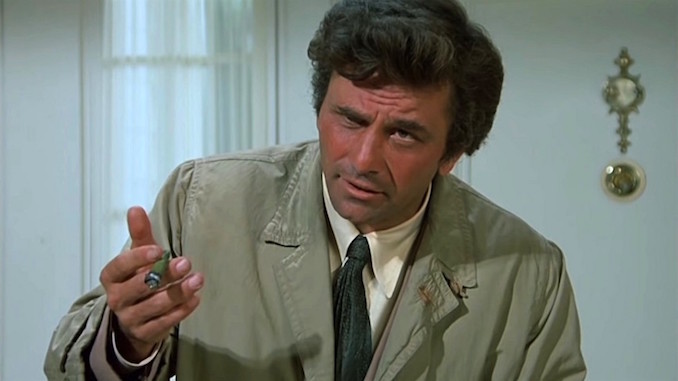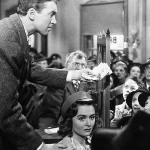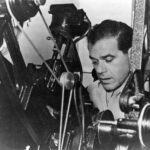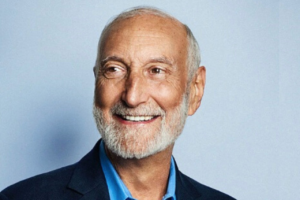Have you ever watched the detective show Columbo? Actor Peter Falk was terrific as Lieutenant Columbo, a highly gifted, cigar smoking problem solver, who wore sloppy clothes and a rumpled coat. Columbo’s appearance and personality were a perfect reflection of a character who was not only brilliant and amusing, but also absent minded, compelling, and unpretentious. One of Columbo’s greatest attributes was that he did not care what people thought of him. Always respectful and polite to everyone, he never thought for a second that he was the smartest person in the room, even though he often was. My better half loves mysteries and problem solving too, so I ended up watching all 69 Columbo episodes during the pandemic (a series of mostly 1.5 hour episodes that ran from 1968-2003), and I can tell you that I am now an official fan of the Columbo series.
It may seem kind of silly to reference a fictitious character from an old TV series for inspiration, but relative to other programs, Columbo is a cut above due to its exemplary performers, writers, and even directors (Steven Spielberg has a directing credit, as does Nicholas Colasanto, who also played one of my all time favorite TV characters, “Coach” from Cheers). Columbo distinguishes itself from other detective shows because it reveals who commits the crime, and how it is done (including each and every detail) at the beginning of each episode. Apparently, this is called the “inverted mystery technique”. It is then up to Lieutenant Columbo to investigate, present the evidence, and prove to everyone who is responsible. This is not too unlike what activists experience with their advocacy work. A crime or crimes are committed, those responsible lie and pretend to be innocent (usually money is involved), while most others believe what they want to believe, and ignore the truth for a variety of reasons. It is then left to the activist to investigate, present the evidence, and then fight the good fight for the purposes of justice and equality.
Here are 3 big takeaways from the Lieutenant Columbo character that could serve activists well:
1. Always try to be kind, and polite, in an authentic way. As Isaac B. Singerso once said, kindness is everything. I always try to remember that most of us who grew up in the US, ate a ton of animal products and processed foods, and that most Americans continue to eat the same way in their adult lives as well. It is not surprising then why a record number of people are sick, billions of factory animals are enduring unimaginable suffering, and our food system is arguably the biggest contributing factor to the climate crisis. I try not to fault people directly as we are all products of our culture and communities. Pretending and being disconnected is what most Americans know, and it is also what our parents, teachers, and culture demand. American Capitalism of course nurtures these toxic qualities as any sense of justice or equality that a child may have is summarily squashed in order to celebrate some of the more dominant American traits such as greed, materialism/consumerism, racism/elitism, celebrity and youth obsessions, and the requisite drive for supremacy over “lesser” beings, which on some level, must include a spiritual uncoupling from life. If you think that I am exaggerating, check out these statistics from author Thom Hartmann (although I don’t always agree with his partisan politics, he is still a great resource for credible, game changing data).
Excerpt:
“The “governed” in today’s America, however, aren’t getting the “happiness” they want or even, frankly, that they need:
— Poverty and homelessness stalk our land: more than one-in-seven Americans live in poverty today
— Millions have no access to affordable healthcare and families suffer over 500,000 medical bankruptcies every year
— Higher education is increasingly just for the well-born and well-off
— Most non-unionized workers have few rights and little say in the workplace: only 10.8 percent of non-government American workers have a union
— Cynicism about politicians is so widespread that only 62 percent of Americans eligible to register to vote have even bothered to do so
— Our wealthiest pay virtually no income taxes: For example, America’s richest man, Jeff Bezos, paid less than 1 percent and NBC reports “The 25 richest Americans paid little to no federal income taxes…”
To contrast, citizens of other wealthy democracies generally have:
— Lower rates of poverty (Finland 5.7%, Denmark 6.5%, Ireland 7.4%, Belgium 8.1%, Netherlands 8.3%, France 8.4%, Norway 8.4%, Canada 8.5%, Sweden 8.8%, etc.),
— A national health care system, so nobody goes bankrupt because somebody in the family got sick (51 countries have national systems)
— College at little to no cost (Denmark, Norway, Finland, and Sweden pay their young people to go to college: the monthly stipend paid to students in Denmark, for example, is $1,078/month; over 10,000 US students are currently attending college in Germany for free, and Americans can also attend college for free along with locals in France, Iceland, Norway, Finland, Sweden, Slovenia, and the Czech Republic)
— Widespread unionization (Iceland 89.1%, Sweden 81%, Denmark 74.5%, Finland 74.2%, Belgium 56.6%, Norway 53%, Slovenia 44.2%, Israel 37.7%, Austria 36.9% etc. [2000 stats])
— More eligible citizens registered to vote (Sweden 80.3%; Belgium, New Zealand, South Korea, Denmark, Australia, Iceland, Netherlands and Taiwan all in the mid-70% range, etc. [2022 stats])
— Rich people who pay their taxes (very top income tax brackets [federal, state, and local] are over 50% in Japan, Denmark, France, Austria, Canada, Portugal, Belgium, Sweden, Finland, Israel and Slovenia and above 45% in Netherlands, Korea, Ireland, Germany, Italy, Australia, Iceland, Luxembourg, and Spain according to the OECD)”
Click here for the entire article from Thom Hartmann.
Most people are good, and although we must hold individuals responsible for their actions, we also need to be mindful that there are bigger issues involved as well, including broken and corrupt political, judicial and economic systems. Until the elephants in the room are addressed too, nothing is going to change. Again, each one of us is a product of our culture and communities. I remain a total work in progress, but I am reminded of an article (and poem) by the always inspiring Buddhist Monk Thich Nhat Hanh. Here is an excerpt from Thay’s (Thich Nhat Hanh’s) powerful piece on compassion:
“After the Vietnam War, many people wrote to us in Plum Village. We received hundreds of letters each week from the refugee camps in Singapore, Malaysia, Indonesia, Thailand, and the Philippines, hundreds each week. It was very painful to read them, but we had to be in contact. We tried our best to help, but the suffering was enormous, and sometimes we were discouraged. It is said that half the boat people fleeing Vietnam died in the ocean; only half arrived at the shores of Southeast Asia.
There are many young girls, boat people, who were raped by sea pirates. Even though the United Nations and many countries tried to help the government of Thailand prevent that kind of piracy, sea pirates continued to inflict much suffering on the refugees. One day, we received a letter telling us about a young girl on a small boat who was raped by a Thai pirate. She was only twelve, and she jumped into the ocean and drowned herself. When you first learn of something like that, you get angry at the pirate. You naturally take the side of the girl. As you look more deeply you will see it differently. If you take the side of the little girl, then it is easy. You only have to take a gun and shoot the pirate. But we can’t do that. In my meditation, I saw that if I had been born in the village of the pirate and raised in the same conditions as he was, I would now be the pirate. There is a great likelihood that I would become a pirate. I can’t condemn myself so easily. In my meditation, I saw that many babies are born along the Gulf of Siam, hundreds every day, and if we educators, social workers, politicians, and others do not do something about the situation, in twenty-five years a number of them will become sea pirates. That is certain. If you or I were born today in those fishing villages, we might become sea pirates in twenty-five years. If you take a gun and shoot the pirate, you shoot all of us, because all of us are to some extent responsible for this state of affairs.”
– Thich Nhat Hanh
I aspire to be more like Thich Nhat Hanh. In a better world, everyone would be accountable and held to the same standards, especially the wealthiest and most powerful. And in a perfect world, the concepts of “millionaires” & “billionaires”, and having more wealth than you need, would no longer exist. 🙂
Click here for Thich Nhat Hanh’s Please Call Me by my True Name poem.
Incidentally, being kind and polite is also good for your health. In fact, kindness really is its own reward! Rachel Piferi of Johns Hopkins University, and Kathleen Lawler of the University of Tennessee found that people who were kind, and provided social support to others lowered their blood pressure. The generous participants also discovered “greater self-esteem, less depression and less stress.”
Click here for the study.
Click here for an excellent article from Mimi O’Connor on how science shows that kindness heals.
2. Be a good listener. One of the reasons that the Lieutenant Columbo character was so effective was because he was a great listener, and hyper-observant. He didn’t blab everything he knew as soon as he knew it. He let things unfold, and took a deep breath. One of the best ways to make new connections, according to Dan Buettner, is to “Listen and don’t hog the conversation. Don’t talk over people. Ask questions. Compliment genuinely and often. Put your phone down when you’re in a social setting and move away if you need to use it. Give people your undivided attention.” Thich Nhat Hanh also had this to say on the importance of listening and understanding when there is a disagreement: “When you make the effort to listen and hear the other side of the story, your understanding increases and your hurt diminishes…The first thing we can do in these situations is to acknowledge internally that the pictures we have in our head, what we think happened, may not be accurate. Our practice is to breathe and walk until we are more calm and relaxed…The second thing we can do, when we are ready, is to tell the people who we think have hurt us that we are suffering and that we know our suffering may have come from our own wrong perception. Instead of coming to the other person or people with an accusation, we can come to them for help and ask them to explain, to help us understand why they have said or done those things…There is a third thing we need to do, if we can. The third thing is very hard, perhaps the hardest. We need to listen very carefully to the other person’s response to truly understand and try to correct our perception. With this, we may find that we have been the victim of our wrong perceptions. Most likely the other person has also been a victim of wrong perceptions.”
Click here to learn more about Thich Nhat Hanh, and the art of Deep Listening.
Click here for a Dan Buettner piece on how to make friends as an adult.
Click here for an article from 350PDX.org, titled “Attentive Silence: The role of listening in the environmental justice movement.”
3. Be humble, and never be arrogant or a show off. Just because you may know something, doesn’t mean that you are smarter than everyone else. Lieutenant Columbo personified this quality. Howard Zinn once said that knowledge, while fascinating in itself, is insufficient without action, especially while so many people in the world don’t have the same opportunities to experience that fascination. Plus, people are more likely to be curious and listen when they feel genuinely respected. So yes, being humble will help our advocacy work in every way. In fact, it will even improve your health. How so? According to one study, “A growing body of research suggests that people who are more humble tend to enjoy better physical and mental health than individuals who are less humble.” Very cool. 🙂
Click here for the study on humility and stressful life events.
Peter Falk, aside from being wonderful as Lieutenant Columbo, also starred in many other movies and shows, including Frank Capra’s disappointing “Pocketful of Miracles”. Although Mr. Falk’s performance was described by Frank Capra as “the one bright spark”, it was nonetheless a Frank Capra film, and he was still one of the great directors of all time and near the peak of his powers (in 1961). Mr. Capra later called the film “miserable”, and said it was the first time he had done a picture just for the money. I bring all of this up only to share an excerpt from Frank Capra’s acceptance speech from the 10th Annual AFI Lifetime Achievement Awards in 1982, which was both moving and unsurprising, if you love his film, It’s A Wonderful Life, as much as I do. As per Frank Capra, “I love listening to all of this so-called Art of Frank Capra. Art….Tonight I am going to tell you the real secret of the whole thing. The Art of Frank Capra is very very simple. It is the love of people. And add two simple ideals to this love of people, the freedom of each individual, and the equal importance of each individual, and you have the principle on which I base all of my films.” He also had this advice for the new generation, “Don’t follow trends. Start trends. Don’t compromise. Believe in yourself because only the valiant can create…” Wow, such a charming speech, and I love that he stressed the equal importance of each individual, which to me means everyone on the planet, including each and every being, and Mother Earth herself!
Click here for Frank Capra’s sweet AFI acceptance speech in 1982.
Click here for the final scene of one of the greatest movies of all time, “It’s A Wonderful Life.”
So, yes, Columbo. Who knew? Great character. Great show. And great lessons. Plus, an excuse to talk about the legendary director Frank Capra. Until next time. 🙂
“All you can take with you is that which you’ve given away”
– It’s a Wonderful Life (1946 film)
Sources:
Click here for one of the best endings of a Columbo episode.
Click here for Columbo’s best so-called “Gotcha” moments.
Click here to learn more about Thich Nhat Hanh’s story.
Click here to learn more about Thich Nhat Hanh.
Click here to learn more about the dangers of capitalism.
Oh man, who doesn’t love the character Coach, from Cheers?
Click here for the best of “Coach”, Part One.
Click here for the best of “Coach”, Part Two.
Click here to learn more about why the world still loves the 1970s detective show Columbo.
Click here to learn about a Columbo statue (with his dog) in Budapest.














